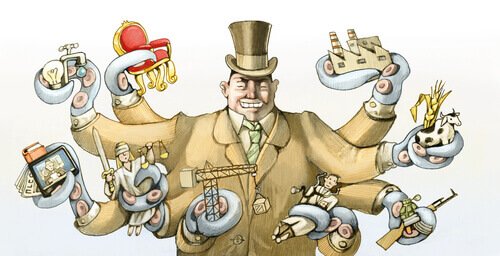Why Spend More Money Than You Have?

We use money to acquire goods. However, many emotions also arise thanks to it. In fact, a lot of people’s main goal in life is having tons of money and being able to spend it however they want.
Even though it might be sad to admit, buying things helps some people cover up or compensate for other things they lack, such as affection. However, this can make people fall into the trap of spending more than they have.
The current economy wants us to be in debt. The economy encourages us to spend more money than we earn by “facilitating” our purchases as much as possible. They make us spend because they know everyone has some kind of baggage. Advertising and marketing do whatever it takes to make us believe that going shopping can solve our problems. Although they might not do this directly, they definitely drop hints and suggestions.

Spending to cover up what you lack
People who tend to spend lots of money usually lack stimuli or incentives in their lives. They decide to go shopping in order to “feel better”. This is because shopping feeds an unconscious feeling of power and control. The stores are at your feet and you’re the one who decides what to buy and what not to buy. The client is always right and is always treated in a proper way.
Being in debt can also be a mechanism to process discomfort in life. It’s possible that owing money and falling into the credit trap also helps cover up unresolved grief or a relentless anguish.
“People do not buy goods and services. They buy relations, stories, and magic.”
-Seth Godin-
It’s easier for us to think that we can’t sleep at night because we owe money than because of what we’re actually feeling. It’s also easier to pay attention to our bank accounts and get everything fixed at the bank than accepting and dealing with our dissatisfaction.
Manipulation makes people spend money
There are two psychological realities that make consumers easy to manipulate: fear and guilt. The persuasive mechanisms that advertisements almost always play with these emotions. They send you an indirect message. In an advertisement, it’s common for them to show a daily situation in which comfort and calmness are directly related to buying a product. Of course, it’s up to the people watching to interpret what happens when you don’t buy it.
There are other ways of manipulation. Cornell University did an experiment in the year 1977. The researchers gave a false test to a group of people. One of the participants, who was an infiltrated investigator, left the room and came back with free sodas for some of them. At the end of the test, the infiltrated investigator asked them to buy tickets for a raffle. The people who had gotten a soda bought double the tickets.

They repeated the experiment one more time, without the free sodas. That time, only a small number of participants bought raffle tickets. They concluded that gifts encourage people to buy and spend money. That’s the reason why certain brands give out samples at the supermarket. You can also see it in other stores when they give you free gifts with your purchase. They know that by doing this they’re making you want to spend more money on their products.
There are many examples of this. In fact, certain areas specialize in the study of consumer behavior. The system (the financial one in particular) needs us to be eager to buy without caring about being in debt. They sell us a fantasy of false control and satisfaction, which is the first thing we buy. That’s what it’s all about.
“Creative without strategy is called ‘art’. Creative with strategy is called ‘advertising’.”
-Jef I. Richards-
We use money to acquire goods. However, many emotions also arise thanks to it. In fact, a lot of people’s main goal in life is having tons of money and being able to spend it however they want.
Even though it might be sad to admit, buying things helps some people cover up or compensate for other things they lack, such as affection. However, this can make people fall into the trap of spending more than they have.
The current economy wants us to be in debt. The economy encourages us to spend more money than we earn by “facilitating” our purchases as much as possible. They make us spend because they know everyone has some kind of baggage. Advertising and marketing do whatever it takes to make us believe that going shopping can solve our problems. Although they might not do this directly, they definitely drop hints and suggestions.

Spending to cover up what you lack
People who tend to spend lots of money usually lack stimuli or incentives in their lives. They decide to go shopping in order to “feel better”. This is because shopping feeds an unconscious feeling of power and control. The stores are at your feet and you’re the one who decides what to buy and what not to buy. The client is always right and is always treated in a proper way.
Being in debt can also be a mechanism to process discomfort in life. It’s possible that owing money and falling into the credit trap also helps cover up unresolved grief or a relentless anguish.
“People do not buy goods and services. They buy relations, stories, and magic.”
-Seth Godin-
It’s easier for us to think that we can’t sleep at night because we owe money than because of what we’re actually feeling. It’s also easier to pay attention to our bank accounts and get everything fixed at the bank than accepting and dealing with our dissatisfaction.
Manipulation makes people spend money
There are two psychological realities that make consumers easy to manipulate: fear and guilt. The persuasive mechanisms that advertisements almost always play with these emotions. They send you an indirect message. In an advertisement, it’s common for them to show a daily situation in which comfort and calmness are directly related to buying a product. Of course, it’s up to the people watching to interpret what happens when you don’t buy it.
There are other ways of manipulation. Cornell University did an experiment in the year 1977. The researchers gave a false test to a group of people. One of the participants, who was an infiltrated investigator, left the room and came back with free sodas for some of them. At the end of the test, the infiltrated investigator asked them to buy tickets for a raffle. The people who had gotten a soda bought double the tickets.

They repeated the experiment one more time, without the free sodas. That time, only a small number of participants bought raffle tickets. They concluded that gifts encourage people to buy and spend money. That’s the reason why certain brands give out samples at the supermarket. You can also see it in other stores when they give you free gifts with your purchase. They know that by doing this they’re making you want to spend more money on their products.
There are many examples of this. In fact, certain areas specialize in the study of consumer behavior. The system (the financial one in particular) needs us to be eager to buy without caring about being in debt. They sell us a fantasy of false control and satisfaction, which is the first thing we buy. That’s what it’s all about.
“Creative without strategy is called ‘art’. Creative with strategy is called ‘advertising’.”
-Jef I. Richards-
This text is provided for informational purposes only and does not replace consultation with a professional. If in doubt, consult your specialist.







